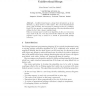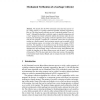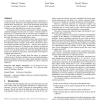159
click to vote
IWMM
2011
Springer
14 years 5 months ago
2011
Springer
To achieve optimal performance, garbage-collected applications must balance the sizes of their heaps dynamically. Sizing the heap too small can reduce throughput by increasing the...
125
click to vote
IWMM
1992
Springer
15 years 6 months ago
1992
Springer
Abstract. We present a garbage collection algorithm that extends generational scavenging to collect large older generations (mature objects) non-disruptively. The algorithm's ...
131
click to vote
OOPSLA
1997
Springer
15 years 6 months ago
1997
Springer
A new garbage collection algorithm for distributed object systems, called DMOS (Distributed Mature Object Space), is presented. It is derived from two previous algorithms, MOS (Ma...
117
click to vote
IFL
1997
Springer
15 years 6 months ago
1997
Springer
A unidirectional heap is a heap where all pointers go in one direction, e.g. from newer to older objects. For a strict functional language, such as Erlang, the heap may be arranged...
133
click to vote
IPPS
1999
IEEE
15 years 6 months ago
1999
IEEE
Abstract. We describe how the PVS verification system has been used to verify a safety property of a garbage collection algorithm, originally suggested by Ben-Ari. The safety prope...
141
click to vote
ICDCS
2005
IEEE
15 years 7 months ago
2005
IEEE
Communication-induced checkpointing protocols that ensure rollback-dependency trackability (RDT) guarantee important properties to the recovery system without explicit coordinatio...
148
click to vote
PLDI
2006
ACM
15 years 8 months ago
2006
ACM
Constructing correct concurrent garbage collection algorithms is notoriously hard. Numerous such algorithms have been proposed, implemented, and deployed – and yet the relations...



